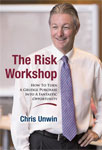CHRISISMS
A fortnightly pearl of wisdom to fast track your success
CHRISISM #60 - Clients’ Thought Bubbles
20 February 2018
How structured is your first client meeting? Do you have clearly identifiable stages to the first client meeting with specific objectives that you are seeking to achieve at the end of each stage?
When I ask advisers at my workshops to outline the structure of their first client meeting, I am amazed by how many advisers look at me with a blank expression as if to say “What do you mean by structure?” and sometimes they even go on to say “I don’t think there’s much point in having a set structure to a first client meeting as we are dealing with people and everyone is different!” So basically what they are saying is they sit down in front of a potential new client for that first meeting and “wing it”! I have always believed that it is crucial that we have a set structure to a first meeting as this gives us confidence when we sit in front of someone we haven’t met before, and it also creates a predictability of outcome. Of course we need to adapt to the different types of people we will encounter, but the fundamentals of the first meeting should remain the same. Right from the start, there were always 4 separate stages to my first client meeting and each stage had a clearly identifiable objective which needed to be achieved in order to proceed to the next stage. The way that I viewed this was that, by the end of each stage I needed to have planted a specific “thought bubble” in the client’s head and that thought bubble created a natural segue to the next stage of the meeting. So let’s have a look at the 4 stages of a first client meeting and identify the thought bubble we are seeking to plant in our client’s head:- Stage One – The Introduction There are quite number of boxes that we need to tick at this initial stage, but most importantly we need to make sure we remove as many unknowns as possible, allay as many fears as possible and dispel as many myths as possible just to name a few of these boxes. However, the thought bubble that we are seeking to plant in the client’s head is simply:- “Yes, I can see myself doing business with this person” Stage Two – The Wants Analysis This stage is more commonly known as the Fact Find, but I think Wants Analysis is a better description, since having set out my stall and created expectations at the Introduction stage, I am now going to hand the baton over to my client and help them tell me what it is they want not in terms of types and levels of cover, but in terms of financial outcomes in certain ‘what if’ scenarios. Provided I succeed in doing this, then the thought bubble that results should be:- “Yes – I want these financial outcomes”
Stage Three – Present The Solution For those of you who have been to the relevant workshop, you will know that this is where I create the “Circle of Safety” with the client, which dumbs down everything I am ever going to discuss with that client in relation to financial planning on to one piece of A4 paper, and it only deals with concepts and outcomes not products, and the thought bubble that we are seeking to plant is:- “Great! He/She can help me achieve the financial outcomes I want!”
Many advisers will conclude the first meeting at the end of Stage Three (or even Stage Two!), but all the good work you have put in up to that point will be a complete waste of time unless you succeed in creating Stage Four’s thought bubble. Stage Four is where you educate your client that when it comes to financial planning there is no such thing as a good idea in theory – only in practice, and therefore you need to get their commitment to action and book a second appointment in the diary. Provided you do these three things, then you will have planted the necessary thought bubble, namely: “And I want these financial outcomes NOW!”
Register for your City using the links below.
Cost: $450 + GST per person |





